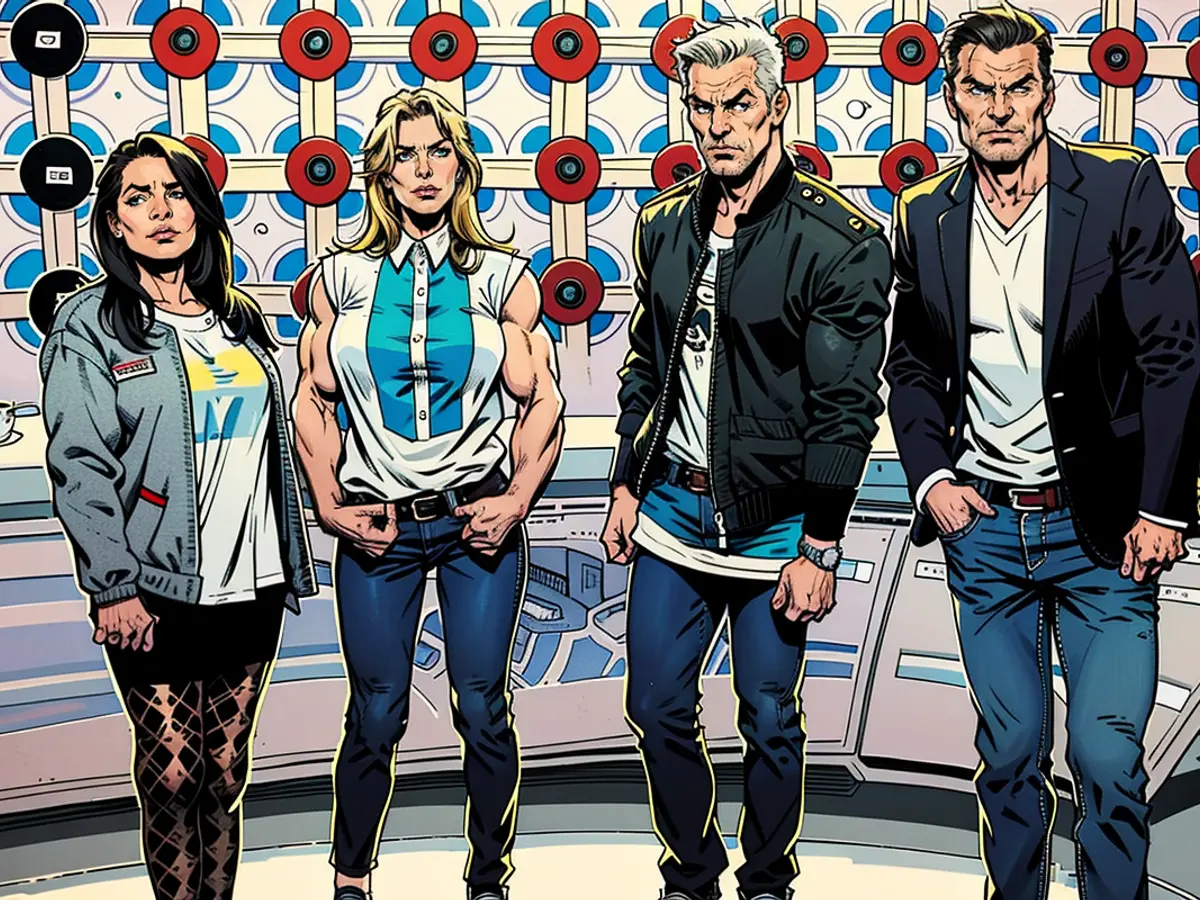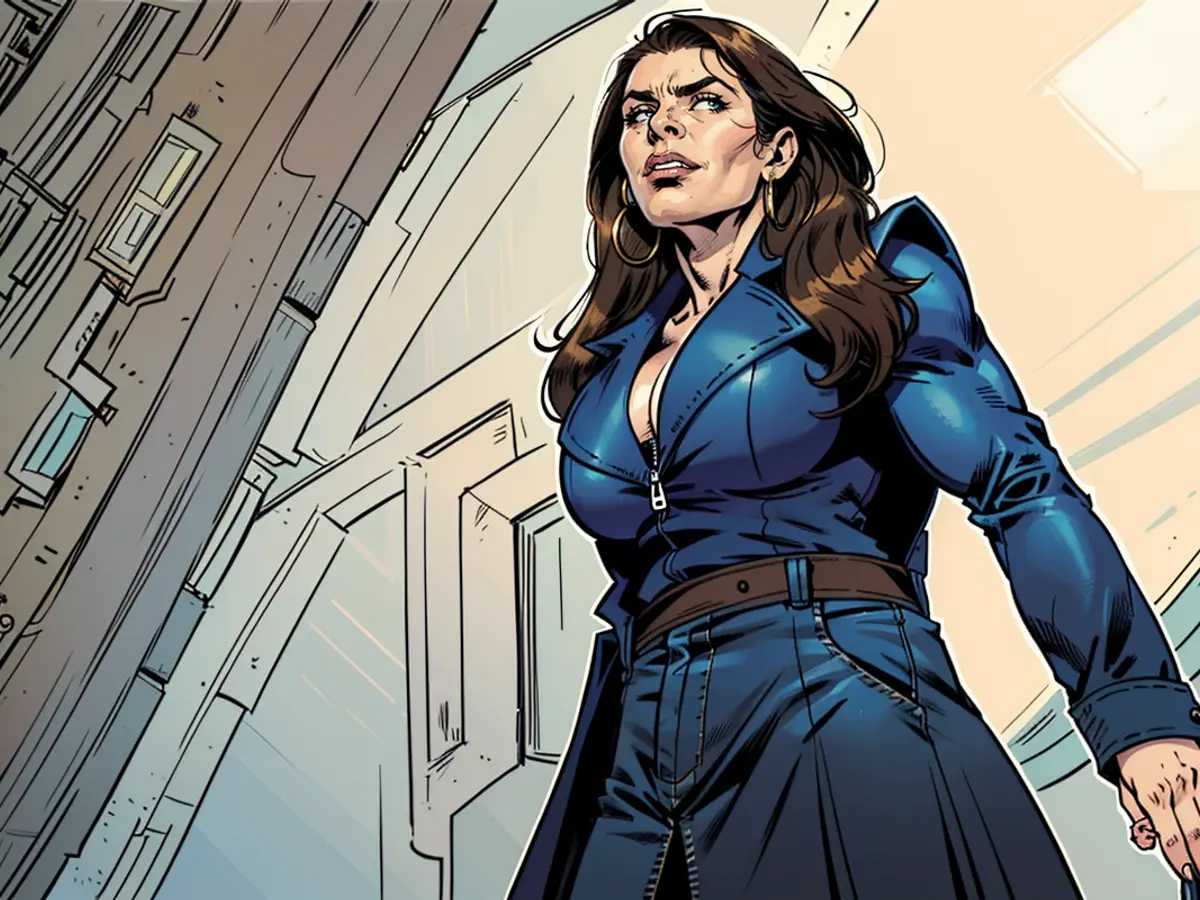Are you a self-important person, Marianne Rosenberg?
"Bunter Planet" is not just the newest album by Marianne Rosenberg. It also represents her aspirations for the future. In an interview with ntv.de, she discusses her past, present, and desires for the future. She shares who she used to love, what she stands up for, and her thoughts on those she consider "jerks."
The name of her album clearly symbolizes her longing for a vibrant world. One where freedom, acceptance, and peace are prevalent. The society we live in is becoming increasingly divided. With hatred, aggression, wars, power struggles, and oppression on one side, on the other hand, more and more people are fighting for tolerance, freedom, and diversity. For the climate and against right-wing populists. It's evident — I'm not the only one who wishes for a colorful planet.
She didn't create this album alone. For instance, the tracks "Bunter Planet" and "Lass die Liebe gewinnen" were produced in collaboration with Leslie Clio. How did this collaboration happen?
I'm in contact with many musicians and have often exchanged ideas. In some cases, this even results in a collaboration, as it did with Leslie Clio this time. She and I share the same sentiment: that disco, though with a slightly new sound, is making a comeback. It's a look I've sported numerous times before but still fits me well. Based on that notion, we created "Bunter Planet."
The list of artists she has worked with is extensive and diverse. This includes people like Rio Reiser, Blixa Bargeld, and Joachim Witt, with whom she recently performed "In unserer Zeit." How significant have these boundary pushers been for her as an artist?
It's enjoyable to meet other musicians and learn about their creative processes. I initially aimed to disrupt the categorical thinking of the early 80s. But I didn't succeed. However, when Blixa, Rio, and I took the stage at the Berlin Schaubuehne, it caused quite a stir. The press sometimes called it the "dream couple" but also the "nightmare." (laughs) Primarily, I wanted to break away from the career they'd assigned to me because I no longer saw myself as what they had made me into.
What do you mean by that?
Basically, when I was still young, people tried to categorize me musically or put me in a specific style. The songwriters assigned to provide lyrics for songs like "Er gehört zu mir" were all in their mid-20s. Meanwhile, in my teenage bedroom, I had posters of soul artists like the Three Degrees, Aretha Franklin, and Percy Sledge hanging on the wall. I yearned to perform like them! But for Schlager music, that was unacceptable. So I had to dress up in denim jumpsuits and sing hits like "Warum mich?" (laughs)
Does it bother you being referred to as a Schlager singer?
No. That's an oversimplification, but still true: there's only good or bad music. The genre doesn't matter. Caterina Valente, who was constantly labeled a Schlager singer in Germany, is an excellent example. She could play the guitar brilliantly and performed in various countries, even beautifully singing Brazilian songs or jazz. The label stems from people who crave tidiness. But life isn't that simple.
Twenty-five appearances in the ZDF hit parade - she's had hits like "Er gehört mir" and "Marleen." Many of her male peers, like Howard Carpendale, reminisce about the wild times from back then, including provocative gatherings in the "Todeszelle" bar of the Schweizer Hof hotel ...
Unfortunately, I missed those wild times. At the time, I was in high school and couldn't make it into the bar. I was infatuated with Ricky Shayne. (laughs) But I had to go to bed early and couldn't join in on their hangovers the next day. They'd cry, whiten their eyes with tears, and glue on false eyelashes as long as Ricky's in real life. I watched it all happen.
Needless to say, this was a male-dominated industry. How was this for you as a woman?
Yeah, it was indeed a male-dominated world. But there were plenty of women who had a say too. The truth is, what wasn't male-dominated in history? Even when women stood up for themselves, things could change quickly. Just look at the 12 years of fascism. Not long ago, in the 20s, women were still free. I think of all the nightclubs and how women looked - sexy, with glamour and cigarette holders. Who would have thought we could switch that around in such a short time? And there's a risk in that for us today. We need to remember and not think that freedom is something easy to achieve. We have to fight for it.
Did you feel the influence of male dominance while participating in the jury of "Germany's Got Talent" 11 years ago? Do you regret it now?
Nah. I didn't feel threaten by male dominance in the jury - it felt more like a joke to me. The star, The Titan, had an image, and Kay One also behaved in a certain way. What bothered me more was how they treated the young singers. The joke was: The women found that hysterical. As an older woman, I couldn't step in. But thank goodness, with #MeToo, that's not happening anymore. I think that's wonderful.
You present yourself as being very much in the present. The songs on "Colorful Planet" seem to reflect that. But there are also moments of nostalgia, for example in the song "Beginning and End..."
Do you really see that song as nostalgic? I don't see it that way. The song is about losing, saying goodbye, and accepting that we all have to let go of things at some point. That's something I'm familiar with. The older we get, the more people we have to say goodbye to - friends or family. Each of us continually lets go of something: memories from childhood, time in youth, a career. To be honest, this song is the one I relate to most on the album. My voice also sounds most like who I am right now in it. In other songs, I often play with my voice, like actors do with their faces. I play with it.
Is the cassette cool, right?
Do you still have a cassette player?
Yep. I do. And I still have cassettes. But I'll have to see if they still work. I also have a record player again. The album is available on vinyl too. A vinyl album with a big cover looks good.
After you did a German interpretation of classic songs by singers like Diana Ross or Gloria Gaynor on the album "Diva," you covered some of them. Are you really a diva?
I've had many titles during my career and can use them to create characters on stage. The stage is an escape from reality, a fantasy world. Whether it's a Schlager princess or diva - these are just roles. It's amazing how many I've collected over the years. I like being able to use them to entertain people.
Commercial success didn't matter to you with "Diva." Do you still not care about it with "Colorful Planet"?
Nope. But hitting number one with "Im Namen der Liebe" showed me that age doesn't matter either. You'll hear it from some people: "That's really interesting. Can I hear the demos?" I thought to myself: "You dunce! I've been in the industry for 50 years - and you want to hear demos from me?"
Did you say that?
No, but that's what I was thinking. Since then, I've met people who recognized the potential in the project and gave me complete control. As a singer, I'm now in charge of my music and ideas. After years of fighting for it, I've finally reached this point. That's the most important thing to me about the number one album. Even though it took me a long time, I'm so glad I managed to emancipate myself.
Your son Max has been involved with you on "Im Namen der Liebe." Why didn't he contribute more to "Colorful Planet"?
Max is really into music and has been for a long time. He's played the guitar since he was very young. But he's also very independent and focuses on his own projects. We've always supported each other, but he was determined about his own path. That's why he only contributed to two songs on "Colorful Planet."
Now he works as a professional in the music business, taking care of many artists and their repertoire. He couldn't devote that much time to me alone. Back then, we worked together because it was fun. I gave him my ideas and he was interested and could spend time on them with me. We had a great time and laughed a lot while making music. It was all very lighthearted, and we knew each other well. It reminded me of painting - you have an idea in your head, and it gets more audible as you go along. We were like two painters painting together.
Max turned you into a grandmother a few years ago - how does that feel to you?
It's wonderful! For many people, that's often a pleasant experience: "I've become a grandmother..." It's total nonsense! It's just something really special. My son has multiplied, and for me, it's great because I can interact with a grandchild without having the constant responsibility of being a parent. Parents can't do that. The older you get, the more you appreciate life. When you have children in the middle years, it's seen as "normal". But even if it happens millions of times, it's always a miracle.
We had Schlagerprincess, Diva, and now Granny - another term comes to mind for you: LGBTQ icon. Some artists and musicians seem to slip into this role effortlessly...
No, I didn't actively seek that out. I was only 16 when I first heard the gay-lesbian community was going crazy over "Fremder Mann, schau mich an, du bist schuld daran". My producers told me about it. I was still in high school and didn't really know what it was all about. But I'm an open person. And I wish it didn't matter what someone believes, where they come from, or what sexuality they have. So I was open, inspired, and receptive.
You were soon performing in clubs like the "Pulverfass" (Hamburg Travesty Club)}...
Yes, but back then, you couldn't easily research what kind of club it was. I had management, was always accompanied, and couldn't sign contracts alone - you had to be 21 to be of legal age. So it happened that I also performed in a club like the "Pulverfass." There, I saw the men with their crazy costumes and makeup. It fascinated me. That perfection and grace fascinated me.
"He belongs to me" should definitely not be missing from any queer party. Can you still listen to the song yourself?
It's both a curse and a blessing for me. Back in the 80s, I cursed it because I didn't want to be the one smiling on the posters. But now, I find the repertoire that the men wrote for me in the 70s to be very progressive. It had elements that didn't exist in Germany at the time. It was the first German pop music, and I can only bow before these compositions and their production. When it plays on the radio, I turn it up loud. (laughs)
For a long time, it seemed like life situations and acceptance in the LGBTQ community were improving. However, we're currently experiencing a societal rollback where many achievements are being questioned. From state-sanctioned homophobia like in Russia, for example. What's your take on that?
Exactly as you say: We've taken a significant step back. This applies generally to discrimination, attacks, and hate. So "Colorful Planet" - that's my answer to that. I believe, however, that many people also understand that it cannot stay like this - not on our streets with our past. They understand that love and empathy are stronger than power and money.
An important event for the LGBTQ community every year is the Eurovision Song Contest. You've tried to participate several times unsuccessfully. Do you still hold a grudge about that?
No, for example, I failed with "Er gehört zu mir" in the German preselection. The decision back then was not from the audience, but from so-called music editors - they were very serious, very stiff, mostly older men. They chose Joy Fleming (Fleming's song "A Song Can Be a Bridge" came in third place at the ESC, Anm. d. Red.). If I had been there with "Er gehört zu mir", I would have at least come in third place. The song was then a huge hit in Germany. So it doesn't bother me - I'm still in the running.
The Eurovision Song Contest took place in Malmö again almost a month ago - Nemo from Switzerland won. Do you still follow the ESC?
Yes, I'm starting to get interested in it again. Not always. We've also had crazy parties with friends before because we didn't take it seriously anymore. But in recent times, it's interesting to me again because there are always very good contributions. France with this great man and his great voice was a highlight for me this year, for example. I also found the Israeli singer great.
You speak out on various political issues time and again. When the Ukraine war broke out, you donated song royalties spontaneously. You're committed against right-wing extremism and position yourself against the AfD. Do you do this as a private person or do you see yourself as an artist with a responsibility?
I won't mention "responsibility" here, but during my concerts, individuals gather who wouldn't normally meet. If given the opportunity to reach out to them and show compassion, I'd suggest taking it. This is particularly pertinent given the current turmoil and how war has become a typical term in our language once again. Politics, in my opinion, encompasses everything from the tiniest to the largest aspects of life. Two individuals together create a political statement: not superior, not inferior, side-by-side, as Ton Steine Scherben's lyrics suggest.
As a descendant of an Auschwitz survivor, what thoughts cross your mind when, for instance, antisemitism is on the rise once more?
The child of an Auschwitz survivor views the world through different eyes. It's about respecting life overall, as well as embracing others without focusing on their origins, beliefs, or sexuality. I'm not sure if previous generations can learn from their experiences. Nonetheless, we may gain a lot of valuable wisdom from them. Most importantly, it must never happen again—absolutely never.
Your song's title mentions, "We toss flowers against wars, and you can love whomever you want." Additionally, the lyrics continue, "Colorful planet, I can already envision it." Are you still hopeful for the future?
I trust in humanity. When a child is born, they anticipate love from their mother or father. This innate expectation signifies that we only need to activate it. My message? Love should be the focus. Should others ridicule me for that, I'd respond with John Lennon's "Imagine."


Read also:
Marianne Rosenberg, known for her album "Bunter Planet," has expressed her support for the LGBTQ community through her music. When her song "Fremder Mann, schau mich an, du bist schuld daran" gained popularity among the gay community, she embraced their recognition, despite initial misgivings. She also performed in clubs popular with the LGBTQ community, such as Hamburg's "Pulverfass."
The Eurovision Song Contest, which has faced controversy regarding its acceptance of LGBTQ participants, is a significant event for this community. Despite failing to make it to the contest several times, Marianne Rosenberg remains enthusiastic, particularly in recent years due to the high-quality entries. She even views the event as a political statement, a platform for unity and transformation.








